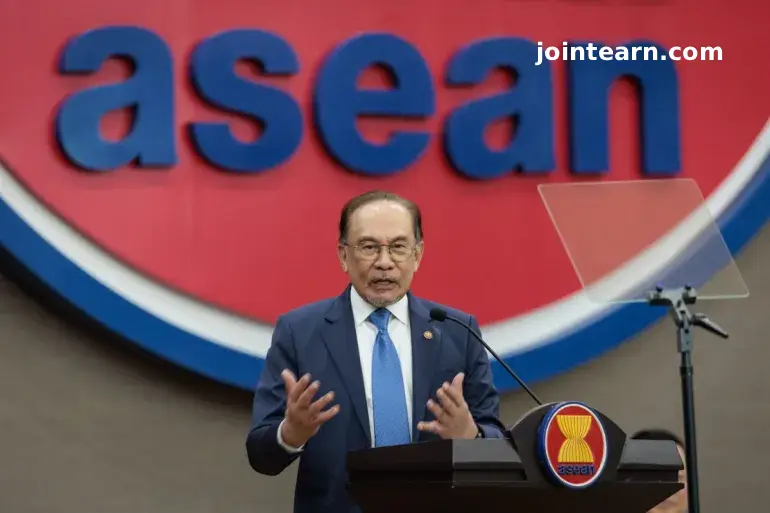
Kuala Lumpur, October 24, 2025 — United States President Donald Trump’s rare visit to Malaysia for the 2025 ASEAN Summit is placing a global spotlight on Prime Minister Anwar Ibrahim’s diplomatic finesse and Malaysia’s strategic balancing between the world’s two superpowers — the US and China.
For Malaysia, a Southeast Asian nation known for its multiracial identity and non-aligned foreign policy, Trump’s arrival is both a diplomatic triumph and a political challenge. His three-day trip marks only the third time in history that a sitting US president has visited the country, following in the footsteps of Barack Obama and Lyndon B. Johnson.
A Historic Visit Amid Global Tensions
Trump’s participation in the ASEAN Summit — hosted in Kuala Lumpur from Sunday to Tuesday — underscores renewed US engagement in Southeast Asia after years of absence. The US president, long skeptical of multilateral forums, skipped ASEAN summits during much of his previous term. His return now signals Washington’s effort to rebuild regional influence as China’s power continues to grow.
Analysts say the visit comes at a crucial time for Malaysia, whose foreign policy under Anwar Ibrahim has prioritized “strategic autonomy” — maintaining strong economic ties with both Washington and Beijing without aligning too closely with either.
“Optimally, Malaysia wants to productively engage both China and the US,” said Thomas Daniel, senior analyst at the Institute of Strategic and International Studies Malaysia (ISIS). “It’s in our national interest to balance both relationships and avoid being forced into a binary choice.”
Malaysia’s Balancing Act Between the US and China
Malaysia’s economy is deeply intertwined with both powers. In 2024, the United States ranked as Malaysia’s top foreign investor and third-largest trading partner, especially in high-tech manufacturing and oil and gas sectors. Meanwhile, China remained Malaysia’s largest trading partner for the 15th consecutive year, dominating the electronics, palm oil, and infrastructure markets.
This dual dependency makes Malaysia’s position delicate. The escalating US-China trade war, with tariffs and export restrictions, threatens Malaysia’s integrated role in global supply chains. Experts warn that an “economic cold war” between the two giants could severely disrupt Southeast Asia’s stability.
“Prolonged tension between Washington and Beijing is the worst thing that could happen to Malaysia,” said Dr. Mohd Ramlan Mohd Arshad from the MARA University of Technology. “We rely on open, rules-based trade that transcends political disputes.”
Anwar’s Diplomatic Vision and Domestic Pressure
Prime Minister Anwar Ibrahim has framed Trump’s visit as an opportunity to strengthen economic partnerships, promote peace in the region, and highlight ASEAN’s relevance in global diplomacy. However, the visit also tests his ability to manage public sentiment at home.
In predominantly Muslim Malaysia, anger over Washington’s support for Israel’s actions in Gaza has sparked frequent protests. Critics, including former Prime Minister Mahathir Mohamad, have urged Anwar to cancel Trump’s invitation, arguing that his administration’s backing of Israel amounts to complicity in war crimes.
Defending his decision, Anwar has emphasized the need for “pragmatic diplomacy” that advances Malaysia’s interests even amid ethical disagreements. “Diplomacy is not about perfection,” he said at a recent Kuala Lumpur forum. “It requires balance, discipline, and courage — even when the world around us shifts.”
ASEAN Summit Agenda: Trade, Peace, and Regional Stability
The 2025 ASEAN Summit will host a range of world leaders including Japanese Prime Minister Sanae Takaichi, Brazilian President Luiz Inácio Lula da Silva, and South Africa’s Cyril Ramaphosa. Notably absent are Chinese President Xi Jinping, Russian President Vladimir Putin, and Indian Prime Minister Narendra Modi.
Top issues on the agenda include regional security, trade cooperation, and de-escalation of recent border tensions between Thailand and Cambodia. Trump is expected to witness the signing of a peace accord between the two nations after a deadly border clash earlier this year.
For Malaysia, a key discussion point will be the removal or reduction of US tariffs — currently at 19 percent — and China’s potential export controls on rare earth minerals. These issues could have a profound impact on Malaysia’s manufacturing and semiconductor industries.
Symbolism and Strategy
While Trump’s visit is expected to boost Malaysia’s diplomatic visibility, experts caution that the real measure of success will depend on tangible outcomes.
“Photo opportunities are important, but substance matters more,” said Professor Awang Azman Awang Pawi of the University of Malaya. “If the summit delivers a ceasefire accord or meaningful trade progress, it will mark a genuine diplomatic achievement for Anwar.”
Others, like independent scholar Dr. Sharifah Munirah Alatas, argue that Malaysia’s pragmatic stance is essential for its long-term survival. “Anwar and Malaysia cannot afford to take sides,” she said. “Amid the unpredictability of the Trump 2.0 era, ASEAN must remain actively non-aligned.”
A Test of Leadership and Vision
Trump’s rare appearance in Malaysia symbolizes both opportunity and risk for Anwar Ibrahim. On one hand, it allows Kuala Lumpur to reaffirm its place at the center of Southeast Asia’s diplomacy; on the other, it tests Anwar’s ability to navigate competing domestic pressures and external expectations.
As Malaysia continues to balance great power politics, the success of Trump’s visit will depend on whether Anwar can transform symbolism into substance — turning diplomatic theater into meaningful regional progress.


Leave a Reply